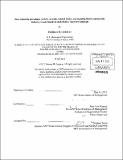Zero emission passenger vehicles in tyhhe [sic] United States, anticipating future automobile industry trends based on stakeholder interview analysis
Author(s)
German, Thomas M
DownloadFull printable version (6.254Mb)
Alternative title
Zero emission passenger vehicles in the United States, anticipating future automobile industry trends based on stakeholder interview analysis
Other Contributors
Sloan School of Management.
Advisor
John Van Maanen.
Terms of use
Metadata
Show full item recordAbstract
My personal interest in automobile evolution is the primary motivation for this thesis. My engineering education and a fifteen year career in professional automobile racing were also inspired by personal passion for automobile development. This thesis was an opportunity to apply technical and business knowledge to an emerging industry challenge. Large, complex, interconnected problems are difficult to comprehend and challenging to solve. Today, the global automobile industry is facing such a problem. Global transportation sector greenhouse gas (GHG) emissions are increasing and the technology to mitigate this increasing threat is not penetrating the consumer market. The thesis objective is to determine how zero emission vehicle adoption may change the Automobile Industry structure in the next fifteen years. Both interviews and literature sources provide the data for this thesis. Sixteen interviews were conducted across five stakeholder groups: automobile industry, government, petroleum industry, utility industry, and academia. The conclusions aggregate interviews, literature sources, and my analysis. The cumulative data suggests transportation sector emissions are a threat to environmental stability. However, significant zero emission vehicle adoption is not expected in the next fifteen years. U.S. CAFE standards, as well as, emission standards in other countries are expected to improve new vehicle fuel efficiency. In China, local pollution problems may inspire zero emission vehicle adoption. But, these incremental improvements are not expected to mitigate the increase in transportation GHG emissions driven by population growth and industrialization. Finally, four concepts are presented to accelerate zero emission vehicle development and adoption. Utilizing existing technology, retiring older technology, modular vehicle architecture, and competition driven development may contribute to faster development and increased adoption. Ultimately, faster development may lead to the better value proposition needed to inspire adoption.
Description
Thesis (M.B.A.)--Massachusetts Institute of Technology, Sloan School of Management, 2012. Cataloged from PDF version of thesis. Includes bibliographical references (p. 80-82).
Date issued
2012Department
Sloan School of ManagementPublisher
Massachusetts Institute of Technology
Keywords
Sloan School of Management.